Ottawa Charter and the Role of Nurses in Diabetes Mellitus Management
VerifiedAdded on 2022/11/13
|10
|2527
|82
Essay
AI Summary
This essay examines the pivotal role of nurses in applying the Ottawa Charter's five core principles to manage diabetes mellitus. It emphasizes nurses' responsibilities in strengthening community action through education and support programs, creating supportive environments for patients and families, fostering personal skill development through training and reflection, promoting healthy public policy, and reorienting health services. The essay highlights nurses' contributions to patient education, nutritional guidance, physical activity programs, and cultural competency. It also discusses the importance of nurses in enacting public policies, such as those related to alcohol and smoking, and in reorienting healthcare services to address risk factors and implement effective treatment strategies for diabetes. The essay underscores that nurses are integral in the effective execution of public health principles and in improving diabetes management globally.

Running head: OTTAWA CHARTER AND THE ROLE OF NURSES 1
Ottawa Charter and The Role of Nurses
Student’s Name
Institutional Affiliation
Ottawa Charter and The Role of Nurses
Student’s Name
Institutional Affiliation
Paraphrase This Document
Need a fresh take? Get an instant paraphrase of this document with our AI Paraphraser
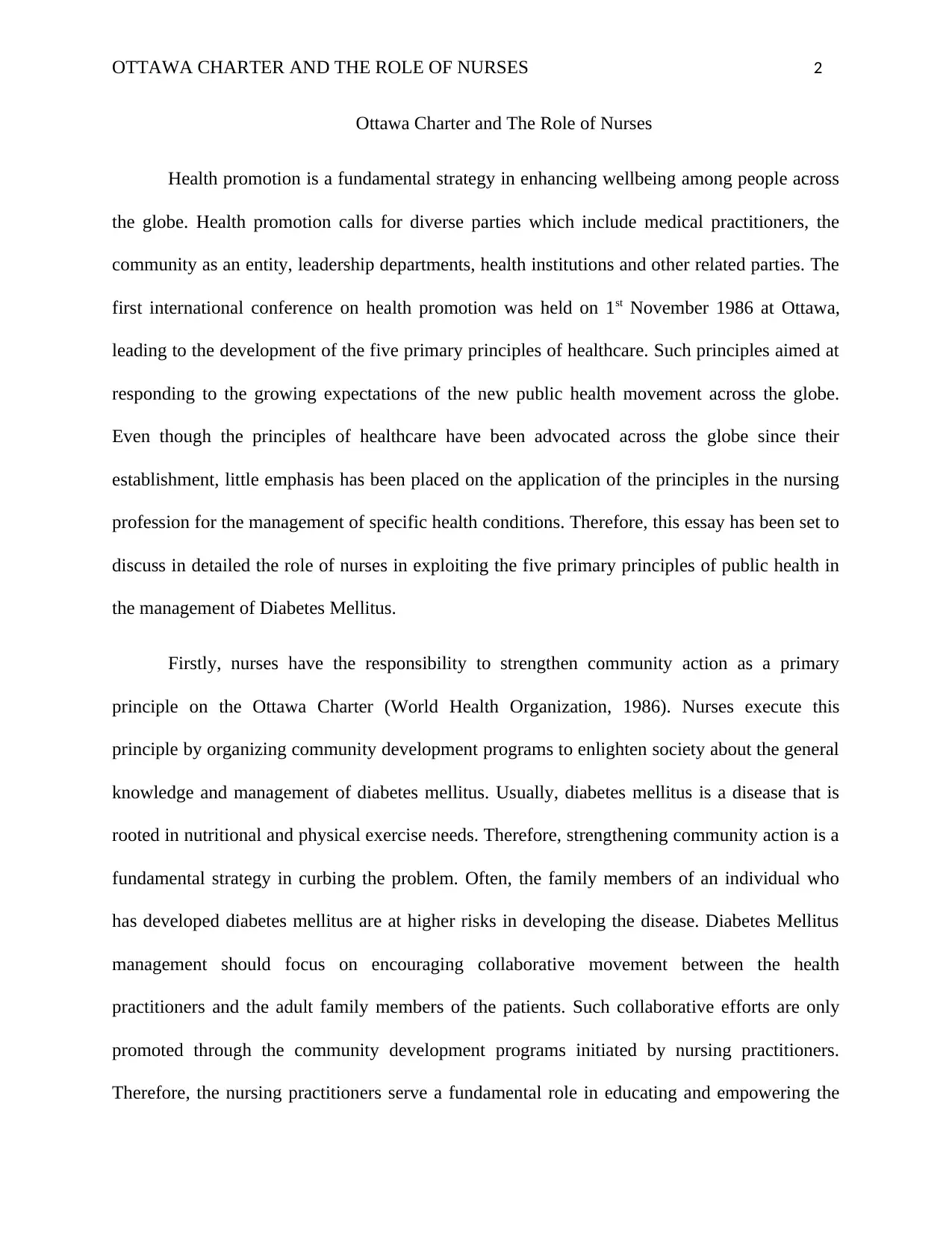
OTTAWA CHARTER AND THE ROLE OF NURSES 2
Ottawa Charter and The Role of Nurses
Health promotion is a fundamental strategy in enhancing wellbeing among people across
the globe. Health promotion calls for diverse parties which include medical practitioners, the
community as an entity, leadership departments, health institutions and other related parties. The
first international conference on health promotion was held on 1st November 1986 at Ottawa,
leading to the development of the five primary principles of healthcare. Such principles aimed at
responding to the growing expectations of the new public health movement across the globe.
Even though the principles of healthcare have been advocated across the globe since their
establishment, little emphasis has been placed on the application of the principles in the nursing
profession for the management of specific health conditions. Therefore, this essay has been set to
discuss in detailed the role of nurses in exploiting the five primary principles of public health in
the management of Diabetes Mellitus.
Firstly, nurses have the responsibility to strengthen community action as a primary
principle on the Ottawa Charter (World Health Organization, 1986). Nurses execute this
principle by organizing community development programs to enlighten society about the general
knowledge and management of diabetes mellitus. Usually, diabetes mellitus is a disease that is
rooted in nutritional and physical exercise needs. Therefore, strengthening community action is a
fundamental strategy in curbing the problem. Often, the family members of an individual who
has developed diabetes mellitus are at higher risks in developing the disease. Diabetes Mellitus
management should focus on encouraging collaborative movement between the health
practitioners and the adult family members of the patients. Such collaborative efforts are only
promoted through the community development programs initiated by nursing practitioners.
Therefore, the nursing practitioners serve a fundamental role in educating and empowering the
Ottawa Charter and The Role of Nurses
Health promotion is a fundamental strategy in enhancing wellbeing among people across
the globe. Health promotion calls for diverse parties which include medical practitioners, the
community as an entity, leadership departments, health institutions and other related parties. The
first international conference on health promotion was held on 1st November 1986 at Ottawa,
leading to the development of the five primary principles of healthcare. Such principles aimed at
responding to the growing expectations of the new public health movement across the globe.
Even though the principles of healthcare have been advocated across the globe since their
establishment, little emphasis has been placed on the application of the principles in the nursing
profession for the management of specific health conditions. Therefore, this essay has been set to
discuss in detailed the role of nurses in exploiting the five primary principles of public health in
the management of Diabetes Mellitus.
Firstly, nurses have the responsibility to strengthen community action as a primary
principle on the Ottawa Charter (World Health Organization, 1986). Nurses execute this
principle by organizing community development programs to enlighten society about the general
knowledge and management of diabetes mellitus. Usually, diabetes mellitus is a disease that is
rooted in nutritional and physical exercise needs. Therefore, strengthening community action is a
fundamental strategy in curbing the problem. Often, the family members of an individual who
has developed diabetes mellitus are at higher risks in developing the disease. Diabetes Mellitus
management should focus on encouraging collaborative movement between the health
practitioners and the adult family members of the patients. Such collaborative efforts are only
promoted through the community development programs initiated by nursing practitioners.
Therefore, the nursing practitioners serve a fundamental role in educating and empowering the
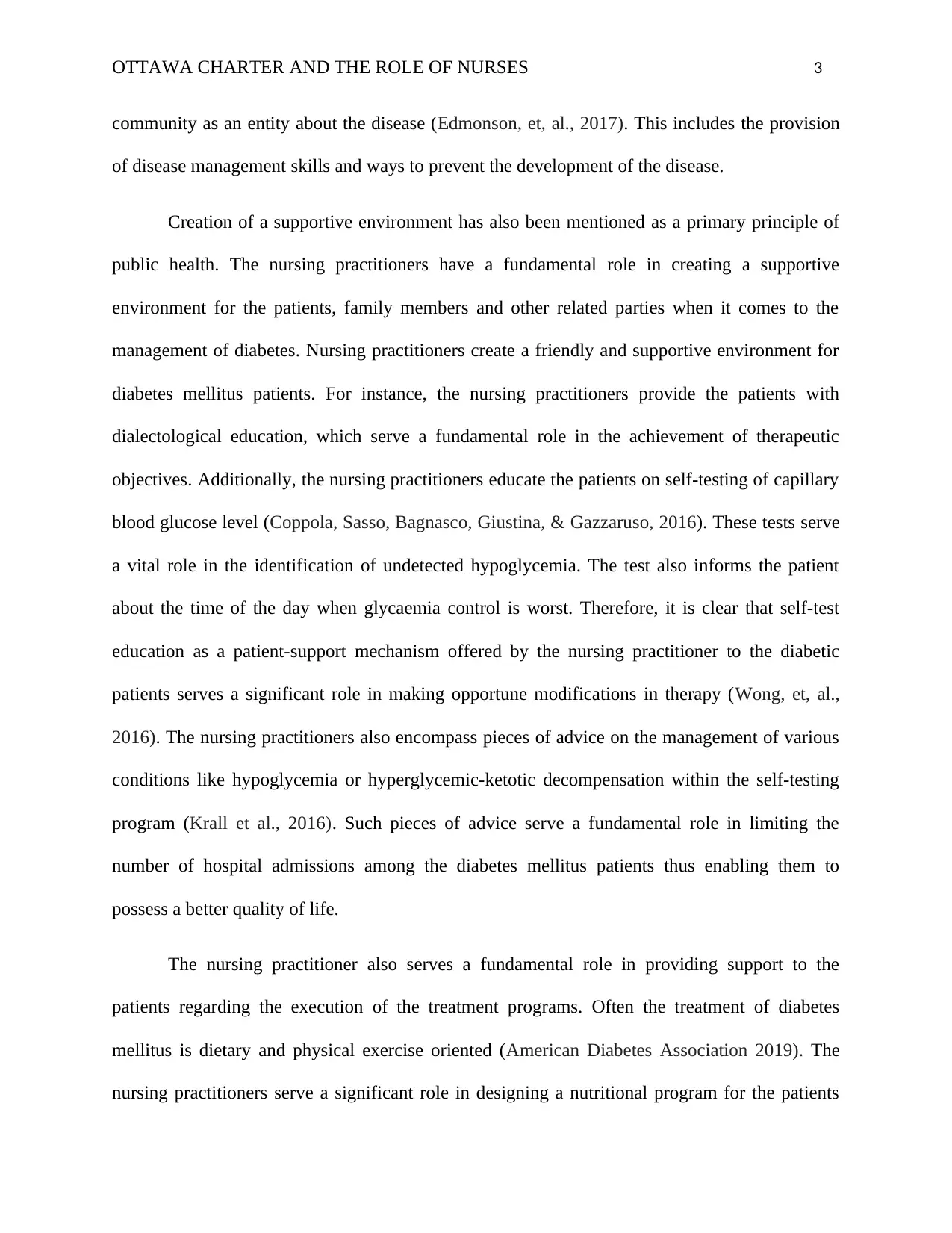
OTTAWA CHARTER AND THE ROLE OF NURSES 3
community as an entity about the disease (Edmonson, et, al., 2017). This includes the provision
of disease management skills and ways to prevent the development of the disease.
Creation of a supportive environment has also been mentioned as a primary principle of
public health. The nursing practitioners have a fundamental role in creating a supportive
environment for the patients, family members and other related parties when it comes to the
management of diabetes. Nursing practitioners create a friendly and supportive environment for
diabetes mellitus patients. For instance, the nursing practitioners provide the patients with
dialectological education, which serve a fundamental role in the achievement of therapeutic
objectives. Additionally, the nursing practitioners educate the patients on self-testing of capillary
blood glucose level (Coppola, Sasso, Bagnasco, Giustina, & Gazzaruso, 2016). These tests serve
a vital role in the identification of undetected hypoglycemia. The test also informs the patient
about the time of the day when glycaemia control is worst. Therefore, it is clear that self-test
education as a patient-support mechanism offered by the nursing practitioner to the diabetic
patients serves a significant role in making opportune modifications in therapy (Wong, et, al.,
2016). The nursing practitioners also encompass pieces of advice on the management of various
conditions like hypoglycemia or hyperglycemic-ketotic decompensation within the self-testing
program (Krall et al., 2016). Such pieces of advice serve a fundamental role in limiting the
number of hospital admissions among the diabetes mellitus patients thus enabling them to
possess a better quality of life.
The nursing practitioner also serves a fundamental role in providing support to the
patients regarding the execution of the treatment programs. Often the treatment of diabetes
mellitus is dietary and physical exercise oriented (American Diabetes Association 2019). The
nursing practitioners serve a significant role in designing a nutritional program for the patients
community as an entity about the disease (Edmonson, et, al., 2017). This includes the provision
of disease management skills and ways to prevent the development of the disease.
Creation of a supportive environment has also been mentioned as a primary principle of
public health. The nursing practitioners have a fundamental role in creating a supportive
environment for the patients, family members and other related parties when it comes to the
management of diabetes. Nursing practitioners create a friendly and supportive environment for
diabetes mellitus patients. For instance, the nursing practitioners provide the patients with
dialectological education, which serve a fundamental role in the achievement of therapeutic
objectives. Additionally, the nursing practitioners educate the patients on self-testing of capillary
blood glucose level (Coppola, Sasso, Bagnasco, Giustina, & Gazzaruso, 2016). These tests serve
a vital role in the identification of undetected hypoglycemia. The test also informs the patient
about the time of the day when glycaemia control is worst. Therefore, it is clear that self-test
education as a patient-support mechanism offered by the nursing practitioner to the diabetic
patients serves a significant role in making opportune modifications in therapy (Wong, et, al.,
2016). The nursing practitioners also encompass pieces of advice on the management of various
conditions like hypoglycemia or hyperglycemic-ketotic decompensation within the self-testing
program (Krall et al., 2016). Such pieces of advice serve a fundamental role in limiting the
number of hospital admissions among the diabetes mellitus patients thus enabling them to
possess a better quality of life.
The nursing practitioner also serves a fundamental role in providing support to the
patients regarding the execution of the treatment programs. Often the treatment of diabetes
mellitus is dietary and physical exercise oriented (American Diabetes Association 2019). The
nursing practitioners serve a significant role in designing a nutritional program for the patients
⊘ This is a preview!⊘
Do you want full access?
Subscribe today to unlock all pages.

Trusted by 1+ million students worldwide
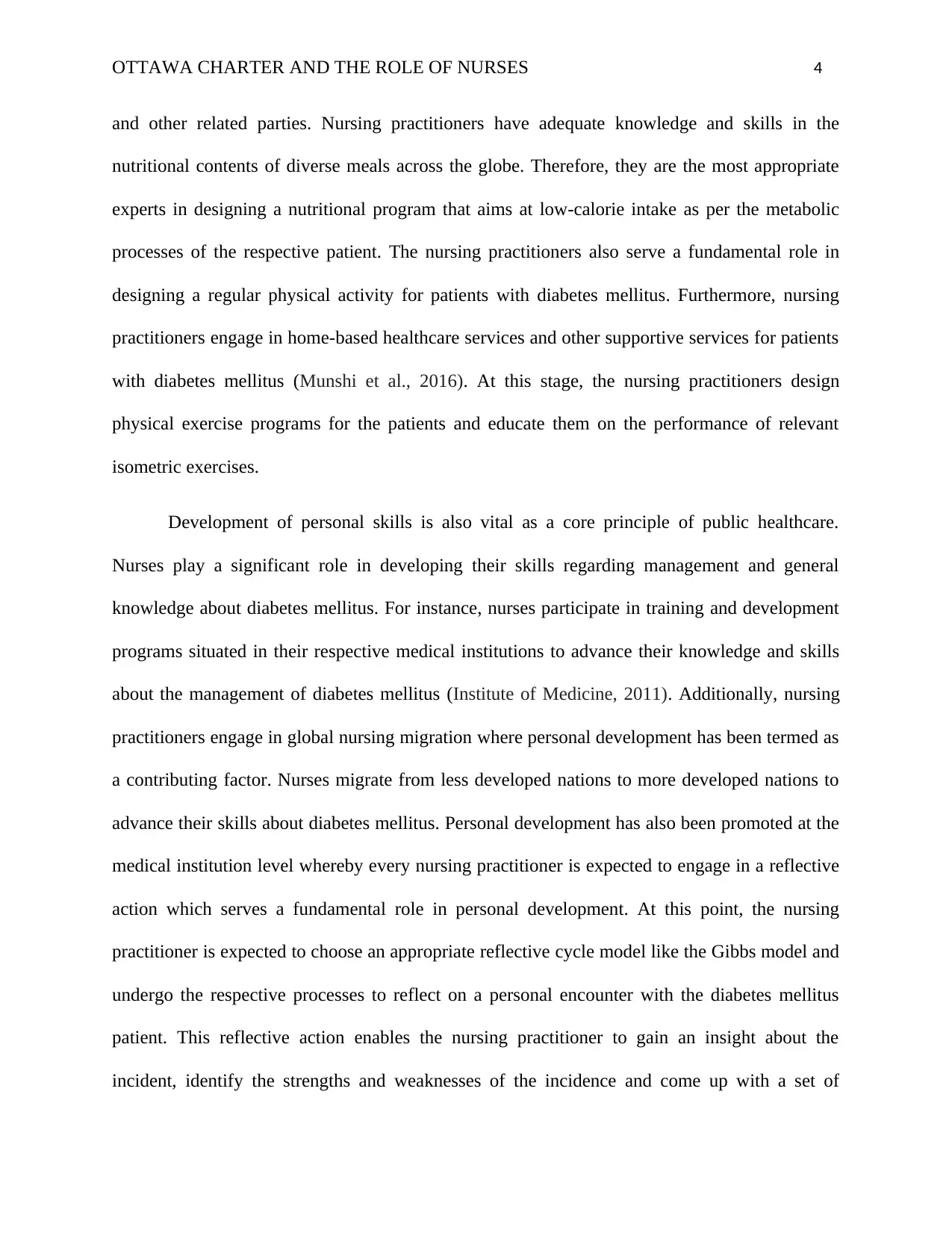
OTTAWA CHARTER AND THE ROLE OF NURSES 4
and other related parties. Nursing practitioners have adequate knowledge and skills in the
nutritional contents of diverse meals across the globe. Therefore, they are the most appropriate
experts in designing a nutritional program that aims at low-calorie intake as per the metabolic
processes of the respective patient. The nursing practitioners also serve a fundamental role in
designing a regular physical activity for patients with diabetes mellitus. Furthermore, nursing
practitioners engage in home-based healthcare services and other supportive services for patients
with diabetes mellitus (Munshi et al., 2016). At this stage, the nursing practitioners design
physical exercise programs for the patients and educate them on the performance of relevant
isometric exercises.
Development of personal skills is also vital as a core principle of public healthcare.
Nurses play a significant role in developing their skills regarding management and general
knowledge about diabetes mellitus. For instance, nurses participate in training and development
programs situated in their respective medical institutions to advance their knowledge and skills
about the management of diabetes mellitus (Institute of Medicine, 2011). Additionally, nursing
practitioners engage in global nursing migration where personal development has been termed as
a contributing factor. Nurses migrate from less developed nations to more developed nations to
advance their skills about diabetes mellitus. Personal development has also been promoted at the
medical institution level whereby every nursing practitioner is expected to engage in a reflective
action which serves a fundamental role in personal development. At this point, the nursing
practitioner is expected to choose an appropriate reflective cycle model like the Gibbs model and
undergo the respective processes to reflect on a personal encounter with the diabetes mellitus
patient. This reflective action enables the nursing practitioner to gain an insight about the
incident, identify the strengths and weaknesses of the incidence and come up with a set of
and other related parties. Nursing practitioners have adequate knowledge and skills in the
nutritional contents of diverse meals across the globe. Therefore, they are the most appropriate
experts in designing a nutritional program that aims at low-calorie intake as per the metabolic
processes of the respective patient. The nursing practitioners also serve a fundamental role in
designing a regular physical activity for patients with diabetes mellitus. Furthermore, nursing
practitioners engage in home-based healthcare services and other supportive services for patients
with diabetes mellitus (Munshi et al., 2016). At this stage, the nursing practitioners design
physical exercise programs for the patients and educate them on the performance of relevant
isometric exercises.
Development of personal skills is also vital as a core principle of public healthcare.
Nurses play a significant role in developing their skills regarding management and general
knowledge about diabetes mellitus. For instance, nurses participate in training and development
programs situated in their respective medical institutions to advance their knowledge and skills
about the management of diabetes mellitus (Institute of Medicine, 2011). Additionally, nursing
practitioners engage in global nursing migration where personal development has been termed as
a contributing factor. Nurses migrate from less developed nations to more developed nations to
advance their skills about diabetes mellitus. Personal development has also been promoted at the
medical institution level whereby every nursing practitioner is expected to engage in a reflective
action which serves a fundamental role in personal development. At this point, the nursing
practitioner is expected to choose an appropriate reflective cycle model like the Gibbs model and
undergo the respective processes to reflect on a personal encounter with the diabetes mellitus
patient. This reflective action enables the nursing practitioner to gain an insight about the
incident, identify the strengths and weaknesses of the incidence and come up with a set of
Paraphrase This Document
Need a fresh take? Get an instant paraphrase of this document with our AI Paraphraser
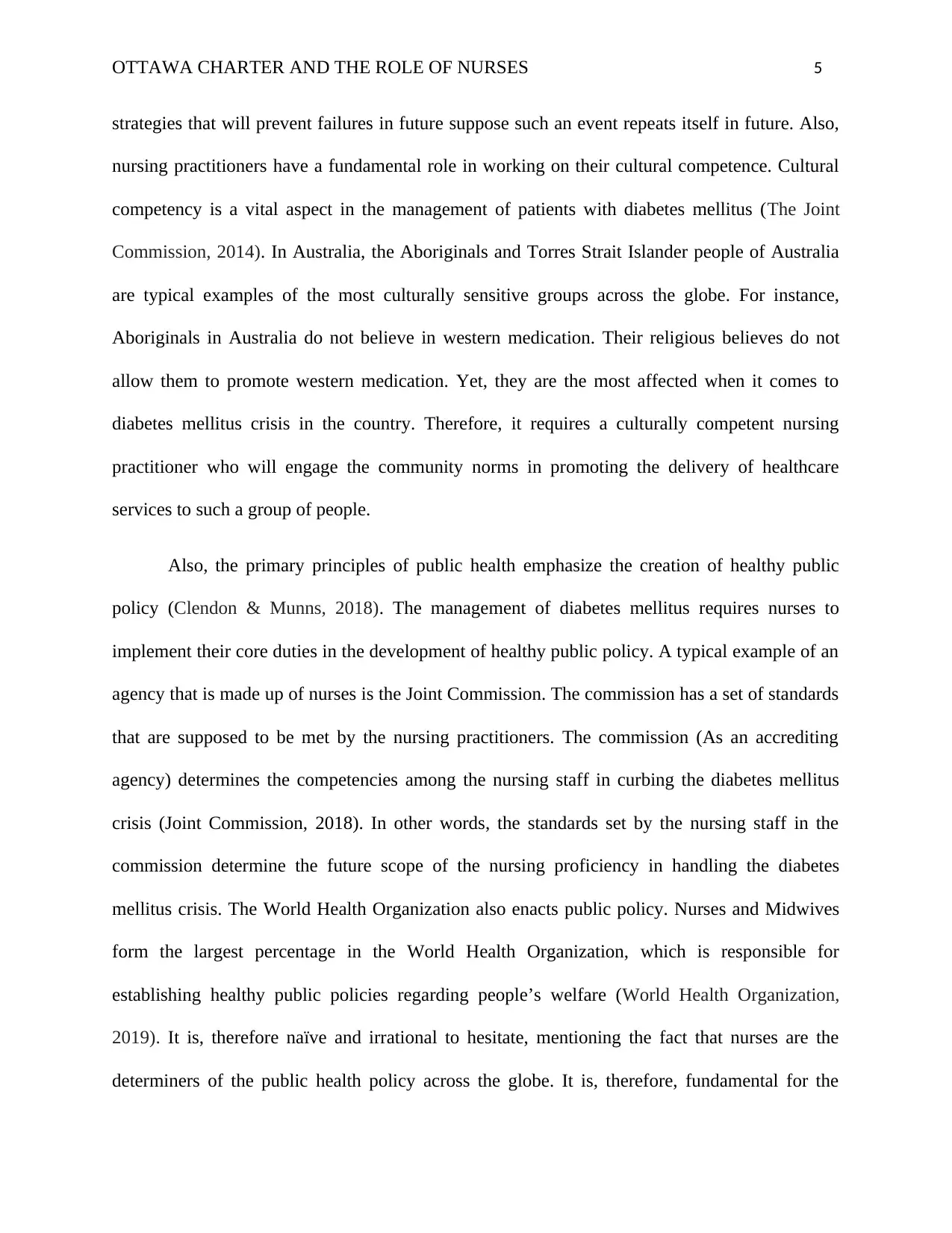
OTTAWA CHARTER AND THE ROLE OF NURSES 5
strategies that will prevent failures in future suppose such an event repeats itself in future. Also,
nursing practitioners have a fundamental role in working on their cultural competence. Cultural
competency is a vital aspect in the management of patients with diabetes mellitus (The Joint
Commission, 2014). In Australia, the Aboriginals and Torres Strait Islander people of Australia
are typical examples of the most culturally sensitive groups across the globe. For instance,
Aboriginals in Australia do not believe in western medication. Their religious believes do not
allow them to promote western medication. Yet, they are the most affected when it comes to
diabetes mellitus crisis in the country. Therefore, it requires a culturally competent nursing
practitioner who will engage the community norms in promoting the delivery of healthcare
services to such a group of people.
Also, the primary principles of public health emphasize the creation of healthy public
policy (Clendon & Munns, 2018). The management of diabetes mellitus requires nurses to
implement their core duties in the development of healthy public policy. A typical example of an
agency that is made up of nurses is the Joint Commission. The commission has a set of standards
that are supposed to be met by the nursing practitioners. The commission (As an accrediting
agency) determines the competencies among the nursing staff in curbing the diabetes mellitus
crisis (Joint Commission, 2018). In other words, the standards set by the nursing staff in the
commission determine the future scope of the nursing proficiency in handling the diabetes
mellitus crisis. The World Health Organization also enacts public policy. Nurses and Midwives
form the largest percentage in the World Health Organization, which is responsible for
establishing healthy public policies regarding people’s welfare (World Health Organization,
2019). It is, therefore naïve and irrational to hesitate, mentioning the fact that nurses are the
determiners of the public health policy across the globe. It is, therefore, fundamental for the
strategies that will prevent failures in future suppose such an event repeats itself in future. Also,
nursing practitioners have a fundamental role in working on their cultural competence. Cultural
competency is a vital aspect in the management of patients with diabetes mellitus (The Joint
Commission, 2014). In Australia, the Aboriginals and Torres Strait Islander people of Australia
are typical examples of the most culturally sensitive groups across the globe. For instance,
Aboriginals in Australia do not believe in western medication. Their religious believes do not
allow them to promote western medication. Yet, they are the most affected when it comes to
diabetes mellitus crisis in the country. Therefore, it requires a culturally competent nursing
practitioner who will engage the community norms in promoting the delivery of healthcare
services to such a group of people.
Also, the primary principles of public health emphasize the creation of healthy public
policy (Clendon & Munns, 2018). The management of diabetes mellitus requires nurses to
implement their core duties in the development of healthy public policy. A typical example of an
agency that is made up of nurses is the Joint Commission. The commission has a set of standards
that are supposed to be met by the nursing practitioners. The commission (As an accrediting
agency) determines the competencies among the nursing staff in curbing the diabetes mellitus
crisis (Joint Commission, 2018). In other words, the standards set by the nursing staff in the
commission determine the future scope of the nursing proficiency in handling the diabetes
mellitus crisis. The World Health Organization also enacts public policy. Nurses and Midwives
form the largest percentage in the World Health Organization, which is responsible for
establishing healthy public policies regarding people’s welfare (World Health Organization,
2019). It is, therefore naïve and irrational to hesitate, mentioning the fact that nurses are the
determiners of the public health policy across the globe. It is, therefore, fundamental for the
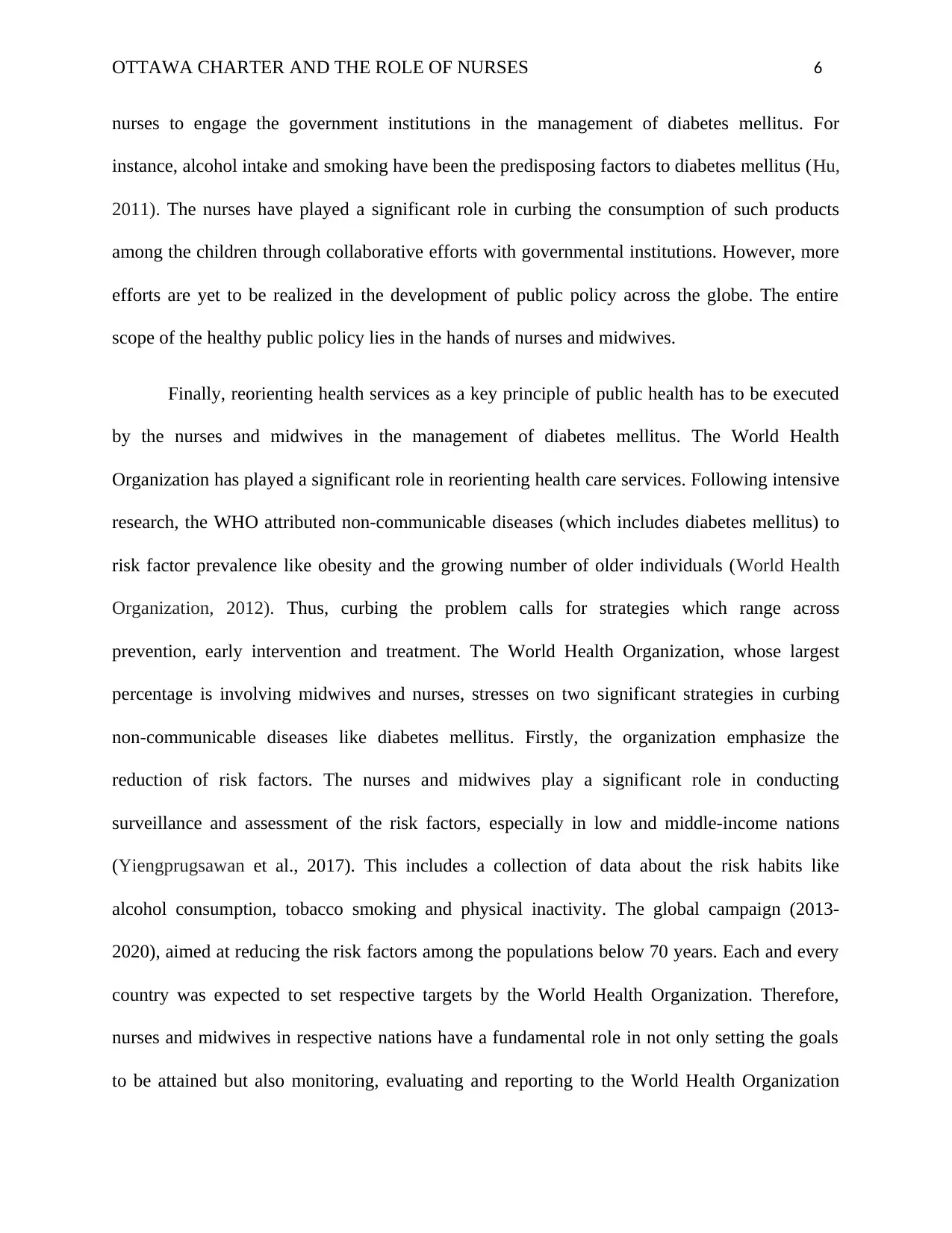
OTTAWA CHARTER AND THE ROLE OF NURSES 6
nurses to engage the government institutions in the management of diabetes mellitus. For
instance, alcohol intake and smoking have been the predisposing factors to diabetes mellitus (Hu,
2011). The nurses have played a significant role in curbing the consumption of such products
among the children through collaborative efforts with governmental institutions. However, more
efforts are yet to be realized in the development of public policy across the globe. The entire
scope of the healthy public policy lies in the hands of nurses and midwives.
Finally, reorienting health services as a key principle of public health has to be executed
by the nurses and midwives in the management of diabetes mellitus. The World Health
Organization has played a significant role in reorienting health care services. Following intensive
research, the WHO attributed non-communicable diseases (which includes diabetes mellitus) to
risk factor prevalence like obesity and the growing number of older individuals (World Health
Organization, 2012). Thus, curbing the problem calls for strategies which range across
prevention, early intervention and treatment. The World Health Organization, whose largest
percentage is involving midwives and nurses, stresses on two significant strategies in curbing
non-communicable diseases like diabetes mellitus. Firstly, the organization emphasize the
reduction of risk factors. The nurses and midwives play a significant role in conducting
surveillance and assessment of the risk factors, especially in low and middle-income nations
(Yiengprugsawan et al., 2017). This includes a collection of data about the risk habits like
alcohol consumption, tobacco smoking and physical inactivity. The global campaign (2013-
2020), aimed at reducing the risk factors among the populations below 70 years. Each and every
country was expected to set respective targets by the World Health Organization. Therefore,
nurses and midwives in respective nations have a fundamental role in not only setting the goals
to be attained but also monitoring, evaluating and reporting to the World Health Organization
nurses to engage the government institutions in the management of diabetes mellitus. For
instance, alcohol intake and smoking have been the predisposing factors to diabetes mellitus (Hu,
2011). The nurses have played a significant role in curbing the consumption of such products
among the children through collaborative efforts with governmental institutions. However, more
efforts are yet to be realized in the development of public policy across the globe. The entire
scope of the healthy public policy lies in the hands of nurses and midwives.
Finally, reorienting health services as a key principle of public health has to be executed
by the nurses and midwives in the management of diabetes mellitus. The World Health
Organization has played a significant role in reorienting health care services. Following intensive
research, the WHO attributed non-communicable diseases (which includes diabetes mellitus) to
risk factor prevalence like obesity and the growing number of older individuals (World Health
Organization, 2012). Thus, curbing the problem calls for strategies which range across
prevention, early intervention and treatment. The World Health Organization, whose largest
percentage is involving midwives and nurses, stresses on two significant strategies in curbing
non-communicable diseases like diabetes mellitus. Firstly, the organization emphasize the
reduction of risk factors. The nurses and midwives play a significant role in conducting
surveillance and assessment of the risk factors, especially in low and middle-income nations
(Yiengprugsawan et al., 2017). This includes a collection of data about the risk habits like
alcohol consumption, tobacco smoking and physical inactivity. The global campaign (2013-
2020), aimed at reducing the risk factors among the populations below 70 years. Each and every
country was expected to set respective targets by the World Health Organization. Therefore,
nurses and midwives in respective nations have a fundamental role in not only setting the goals
to be attained but also monitoring, evaluating and reporting to the World Health Organization
⊘ This is a preview!⊘
Do you want full access?
Subscribe today to unlock all pages.

Trusted by 1+ million students worldwide
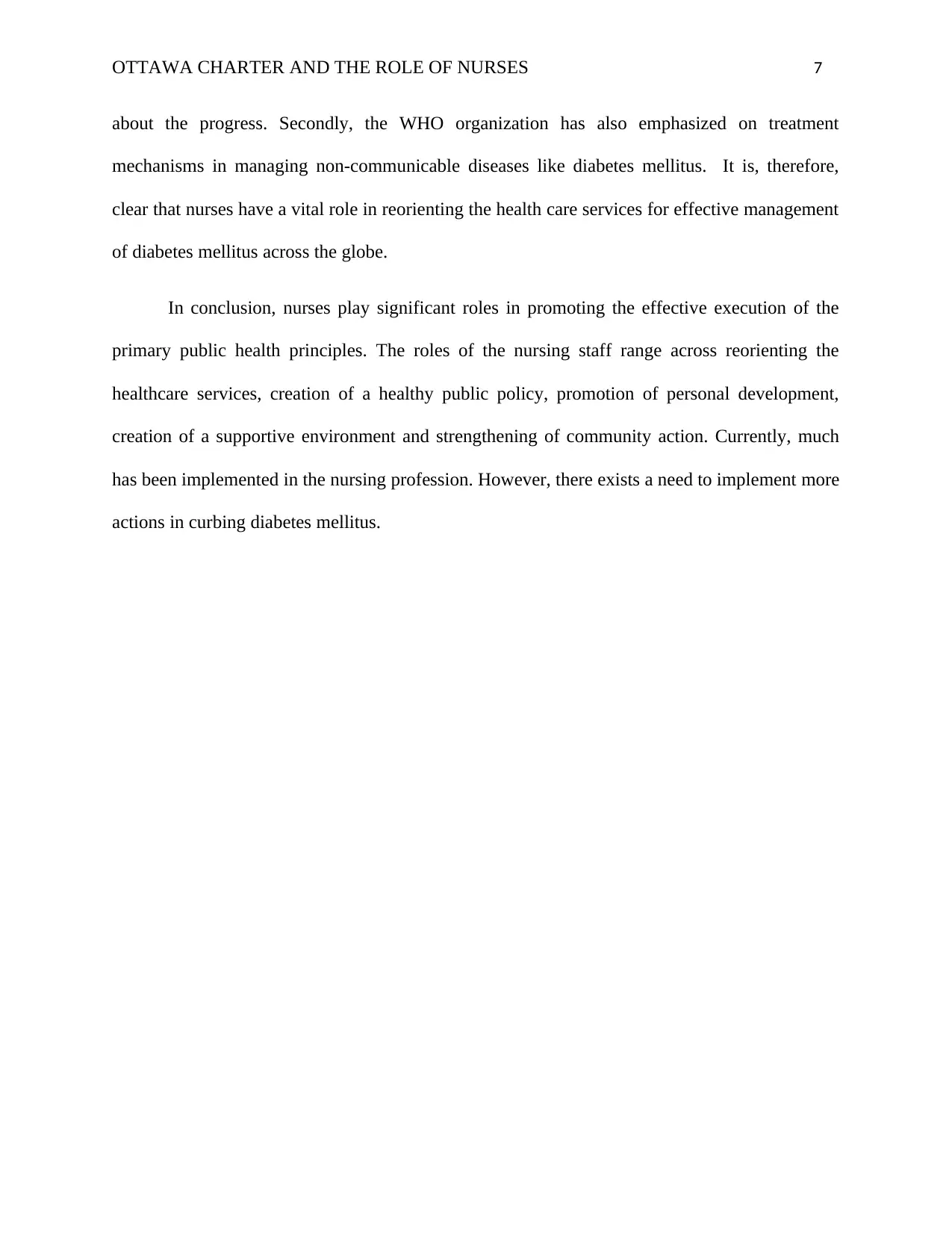
OTTAWA CHARTER AND THE ROLE OF NURSES 7
about the progress. Secondly, the WHO organization has also emphasized on treatment
mechanisms in managing non-communicable diseases like diabetes mellitus. It is, therefore,
clear that nurses have a vital role in reorienting the health care services for effective management
of diabetes mellitus across the globe.
In conclusion, nurses play significant roles in promoting the effective execution of the
primary public health principles. The roles of the nursing staff range across reorienting the
healthcare services, creation of a healthy public policy, promotion of personal development,
creation of a supportive environment and strengthening of community action. Currently, much
has been implemented in the nursing profession. However, there exists a need to implement more
actions in curbing diabetes mellitus.
about the progress. Secondly, the WHO organization has also emphasized on treatment
mechanisms in managing non-communicable diseases like diabetes mellitus. It is, therefore,
clear that nurses have a vital role in reorienting the health care services for effective management
of diabetes mellitus across the globe.
In conclusion, nurses play significant roles in promoting the effective execution of the
primary public health principles. The roles of the nursing staff range across reorienting the
healthcare services, creation of a healthy public policy, promotion of personal development,
creation of a supportive environment and strengthening of community action. Currently, much
has been implemented in the nursing profession. However, there exists a need to implement more
actions in curbing diabetes mellitus.
Paraphrase This Document
Need a fresh take? Get an instant paraphrase of this document with our AI Paraphraser
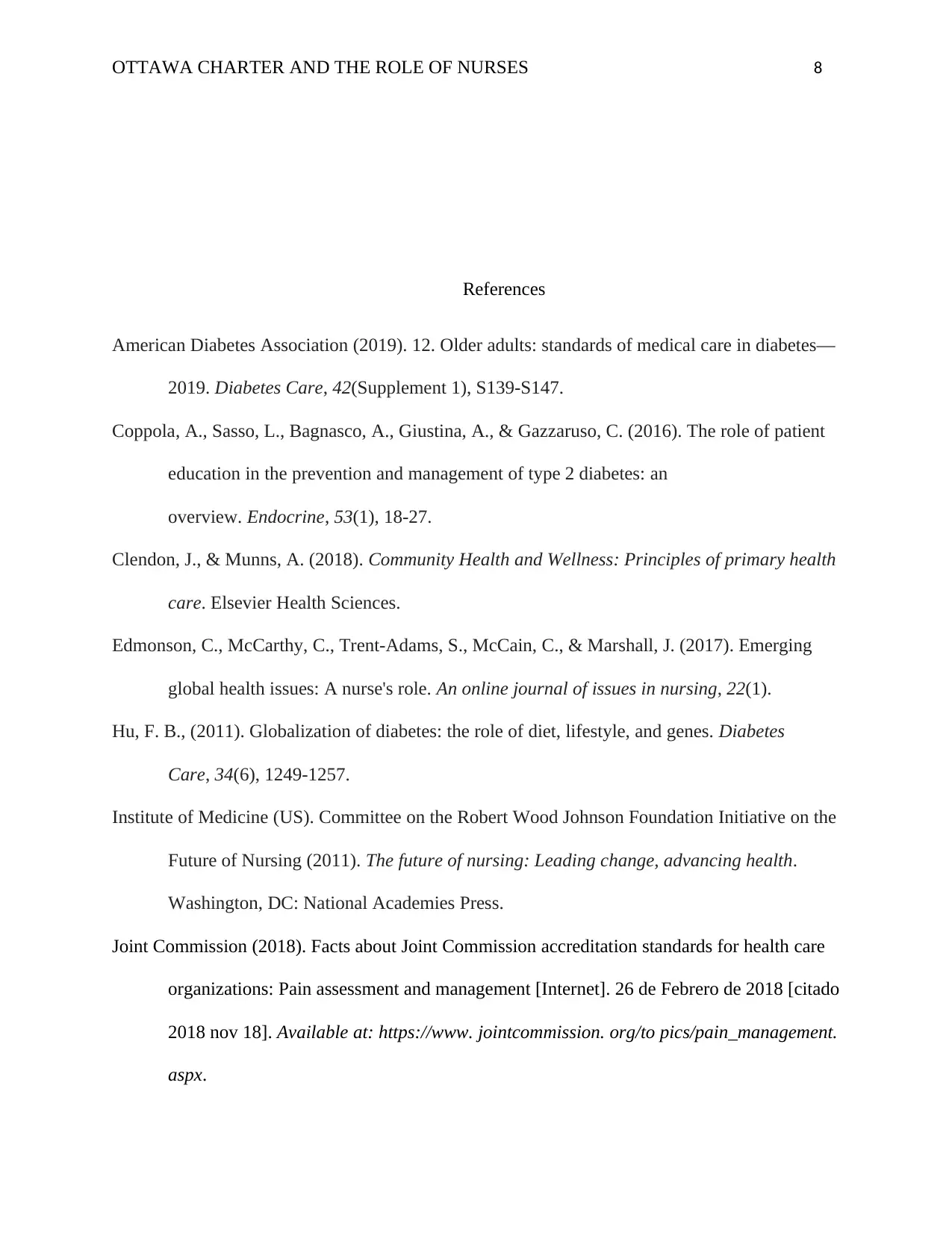
OTTAWA CHARTER AND THE ROLE OF NURSES 8
References
American Diabetes Association (2019). 12. Older adults: standards of medical care in diabetes—
2019. Diabetes Care, 42(Supplement 1), S139-S147.
Coppola, A., Sasso, L., Bagnasco, A., Giustina, A., & Gazzaruso, C. (2016). The role of patient
education in the prevention and management of type 2 diabetes: an
overview. Endocrine, 53(1), 18-27.
Clendon, J., & Munns, A. (2018). Community Health and Wellness: Principles of primary health
care. Elsevier Health Sciences.
Edmonson, C., McCarthy, C., Trent-Adams, S., McCain, C., & Marshall, J. (2017). Emerging
global health issues: A nurse's role. An online journal of issues in nursing, 22(1).
Hu, F. B., (2011). Globalization of diabetes: the role of diet, lifestyle, and genes. Diabetes
Care, 34(6), 1249-1257.
Institute of Medicine (US). Committee on the Robert Wood Johnson Foundation Initiative on the
Future of Nursing (2011). The future of nursing: Leading change, advancing health.
Washington, DC: National Academies Press.
Joint Commission (2018). Facts about Joint Commission accreditation standards for health care
organizations: Pain assessment and management [Internet]. 26 de Febrero de 2018 [citado
2018 nov 18]. Available at: https://www. jointcommission. org/to pics/pain_management.
aspx.
References
American Diabetes Association (2019). 12. Older adults: standards of medical care in diabetes—
2019. Diabetes Care, 42(Supplement 1), S139-S147.
Coppola, A., Sasso, L., Bagnasco, A., Giustina, A., & Gazzaruso, C. (2016). The role of patient
education in the prevention and management of type 2 diabetes: an
overview. Endocrine, 53(1), 18-27.
Clendon, J., & Munns, A. (2018). Community Health and Wellness: Principles of primary health
care. Elsevier Health Sciences.
Edmonson, C., McCarthy, C., Trent-Adams, S., McCain, C., & Marshall, J. (2017). Emerging
global health issues: A nurse's role. An online journal of issues in nursing, 22(1).
Hu, F. B., (2011). Globalization of diabetes: the role of diet, lifestyle, and genes. Diabetes
Care, 34(6), 1249-1257.
Institute of Medicine (US). Committee on the Robert Wood Johnson Foundation Initiative on the
Future of Nursing (2011). The future of nursing: Leading change, advancing health.
Washington, DC: National Academies Press.
Joint Commission (2018). Facts about Joint Commission accreditation standards for health care
organizations: Pain assessment and management [Internet]. 26 de Febrero de 2018 [citado
2018 nov 18]. Available at: https://www. jointcommission. org/to pics/pain_management.
aspx.
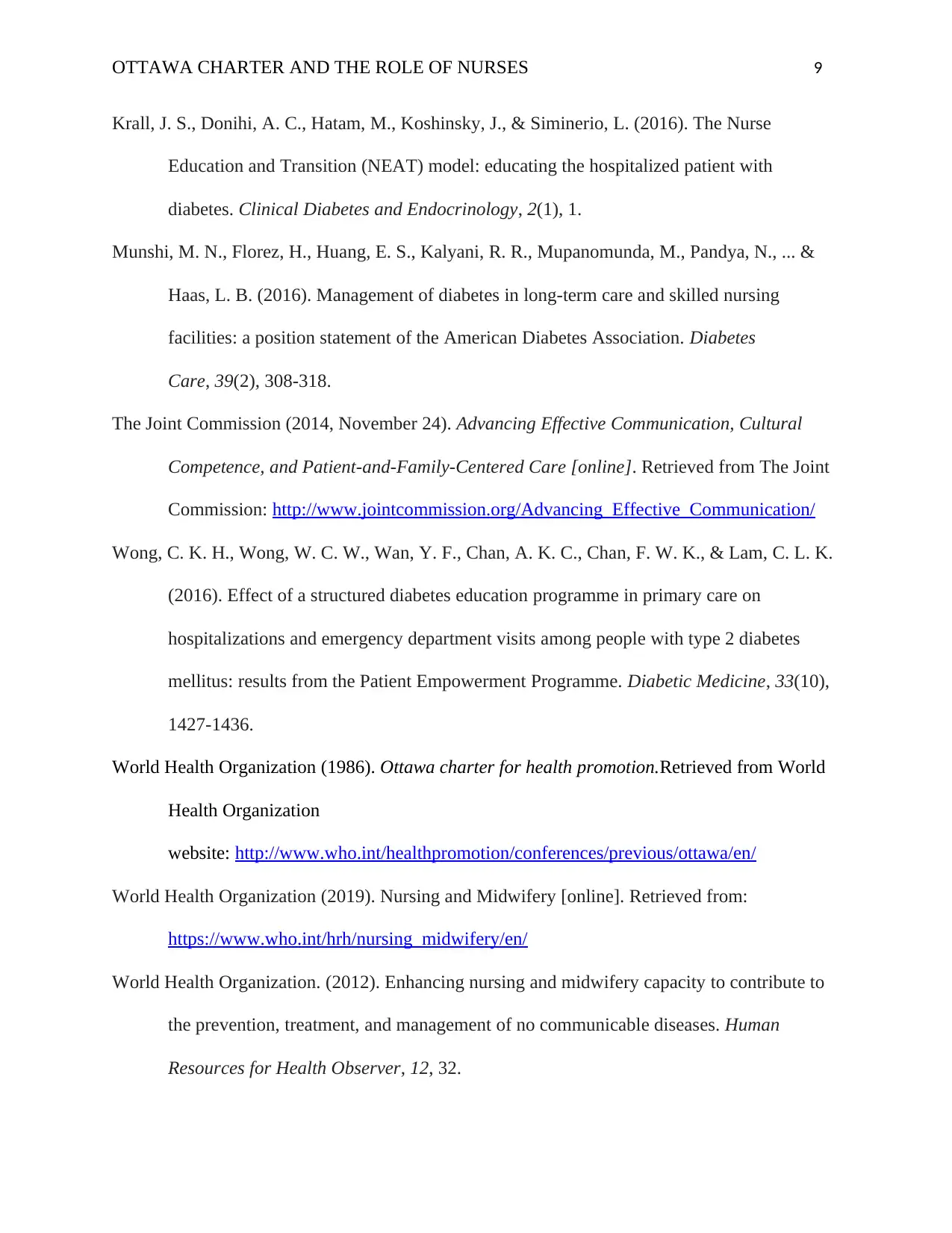
OTTAWA CHARTER AND THE ROLE OF NURSES 9
Krall, J. S., Donihi, A. C., Hatam, M., Koshinsky, J., & Siminerio, L. (2016). The Nurse
Education and Transition (NEAT) model: educating the hospitalized patient with
diabetes. Clinical Diabetes and Endocrinology, 2(1), 1.
Munshi, M. N., Florez, H., Huang, E. S., Kalyani, R. R., Mupanomunda, M., Pandya, N., ... &
Haas, L. B. (2016). Management of diabetes in long-term care and skilled nursing
facilities: a position statement of the American Diabetes Association. Diabetes
Care, 39(2), 308-318.
The Joint Commission (2014, November 24). Advancing Effective Communication, Cultural
Competence, and Patient-and-Family-Centered Care [online]. Retrieved from The Joint
Commission: http://www.jointcommission.org/Advancing_Effective_Communication/
Wong, C. K. H., Wong, W. C. W., Wan, Y. F., Chan, A. K. C., Chan, F. W. K., & Lam, C. L. K.
(2016). Effect of a structured diabetes education programme in primary care on
hospitalizations and emergency department visits among people with type 2 diabetes
mellitus: results from the Patient Empowerment Programme. Diabetic Medicine, 33(10),
1427-1436.
World Health Organization (1986). Ottawa charter for health promotion.Retrieved from World
Health Organization
website: http://www.who.int/healthpromotion/conferences/previous/ottawa/en/
World Health Organization (2019). Nursing and Midwifery [online]. Retrieved from:
https://www.who.int/hrh/nursing_midwifery/en/
World Health Organization. (2012). Enhancing nursing and midwifery capacity to contribute to
the prevention, treatment, and management of no communicable diseases. Human
Resources for Health Observer, 12, 32.
Krall, J. S., Donihi, A. C., Hatam, M., Koshinsky, J., & Siminerio, L. (2016). The Nurse
Education and Transition (NEAT) model: educating the hospitalized patient with
diabetes. Clinical Diabetes and Endocrinology, 2(1), 1.
Munshi, M. N., Florez, H., Huang, E. S., Kalyani, R. R., Mupanomunda, M., Pandya, N., ... &
Haas, L. B. (2016). Management of diabetes in long-term care and skilled nursing
facilities: a position statement of the American Diabetes Association. Diabetes
Care, 39(2), 308-318.
The Joint Commission (2014, November 24). Advancing Effective Communication, Cultural
Competence, and Patient-and-Family-Centered Care [online]. Retrieved from The Joint
Commission: http://www.jointcommission.org/Advancing_Effective_Communication/
Wong, C. K. H., Wong, W. C. W., Wan, Y. F., Chan, A. K. C., Chan, F. W. K., & Lam, C. L. K.
(2016). Effect of a structured diabetes education programme in primary care on
hospitalizations and emergency department visits among people with type 2 diabetes
mellitus: results from the Patient Empowerment Programme. Diabetic Medicine, 33(10),
1427-1436.
World Health Organization (1986). Ottawa charter for health promotion.Retrieved from World
Health Organization
website: http://www.who.int/healthpromotion/conferences/previous/ottawa/en/
World Health Organization (2019). Nursing and Midwifery [online]. Retrieved from:
https://www.who.int/hrh/nursing_midwifery/en/
World Health Organization. (2012). Enhancing nursing and midwifery capacity to contribute to
the prevention, treatment, and management of no communicable diseases. Human
Resources for Health Observer, 12, 32.
⊘ This is a preview!⊘
Do you want full access?
Subscribe today to unlock all pages.

Trusted by 1+ million students worldwide
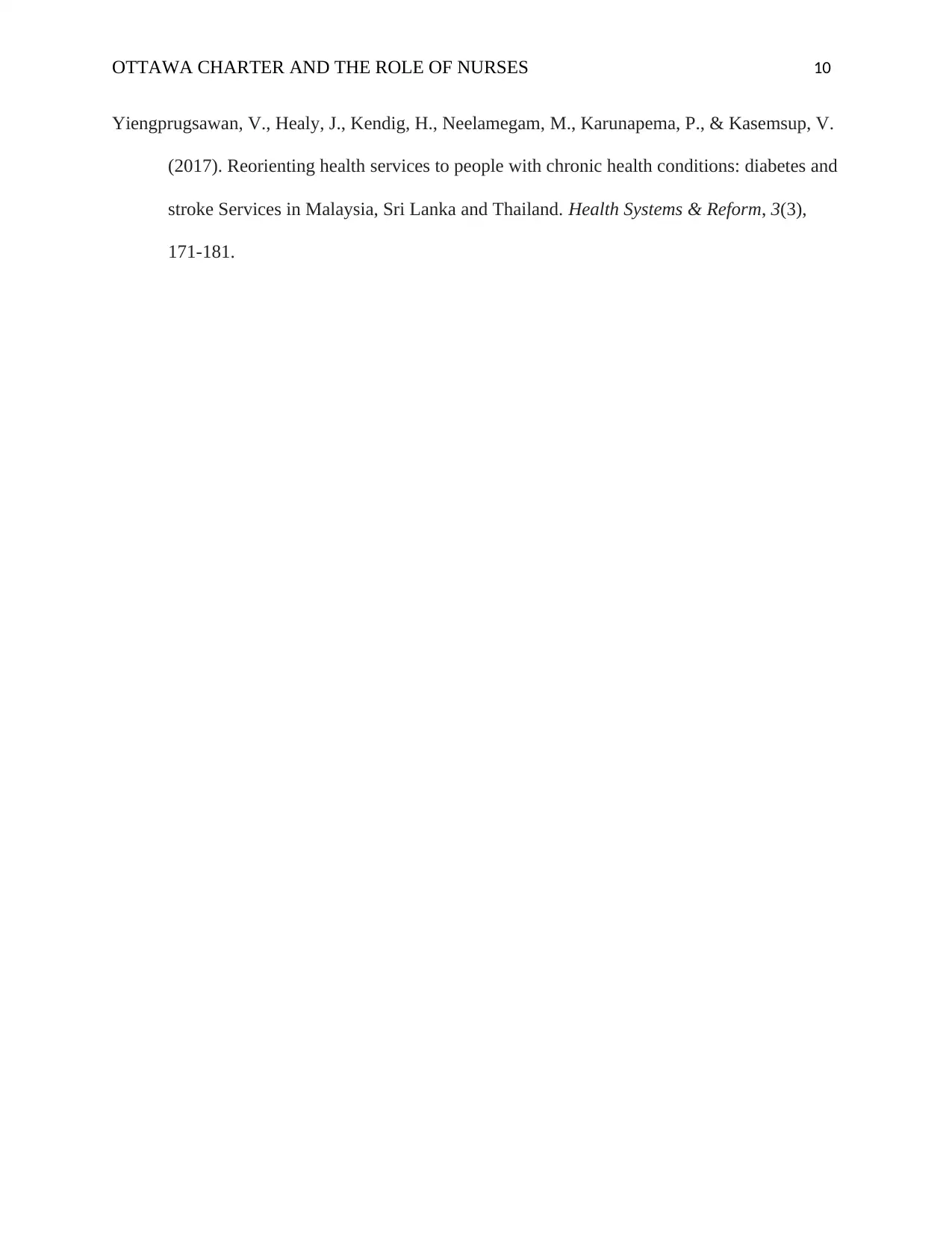
OTTAWA CHARTER AND THE ROLE OF NURSES 10
Yiengprugsawan, V., Healy, J., Kendig, H., Neelamegam, M., Karunapema, P., & Kasemsup, V.
(2017). Reorienting health services to people with chronic health conditions: diabetes and
stroke Services in Malaysia, Sri Lanka and Thailand. Health Systems & Reform, 3(3),
171-181.
Yiengprugsawan, V., Healy, J., Kendig, H., Neelamegam, M., Karunapema, P., & Kasemsup, V.
(2017). Reorienting health services to people with chronic health conditions: diabetes and
stroke Services in Malaysia, Sri Lanka and Thailand. Health Systems & Reform, 3(3),
171-181.
1 out of 10
Related Documents
Your All-in-One AI-Powered Toolkit for Academic Success.
+13062052269
info@desklib.com
Available 24*7 on WhatsApp / Email
![[object Object]](/_next/static/media/star-bottom.7253800d.svg)
Unlock your academic potential
Copyright © 2020–2026 A2Z Services. All Rights Reserved. Developed and managed by ZUCOL.





